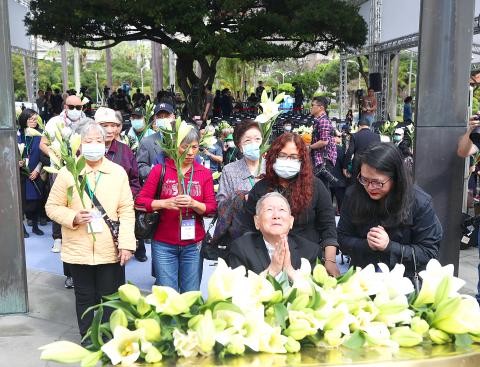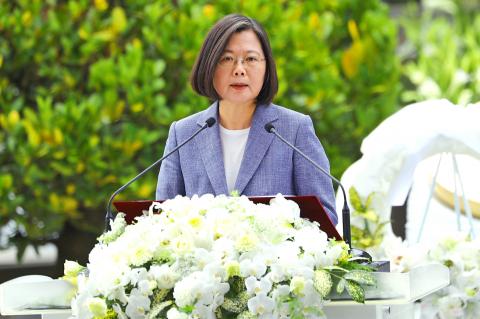President Tsai Ing-wen (蔡英文) yesterday said that she has instructed the National Security Bureau (NSB) to declassify files requested by the Transitional Justice Commission within one month, with the exception of the few that cannot be published due to legal restrictions.
Tsai made the remark in a speech at a ceremony in Taipei commemorating the 228 Incident, a crackdown launched by the then-Chinese Nationalist Party (KMT) regime against civilian demonstrators following an incident in Taipei on Feb. 27, 1947.
Regarding the files the commission has requested — such as those relating to the deaths of political activist Lin I-hsiung’s (林義雄) family members and Carnegie Mellon University assistant professor of statistics Chen Wen-chen (陳文成) — the bureau must “maximize transparency and minimize restrictions” for public use, she said.

Photo: CNA
The government’s efforts to promote human rights education would continue, Tsai said, adding that the Control Yuan’s soon-to-be-established national human rights commission should endeavor to ensure that the concept of human rights takes root in Taiwan.
The bureau later said that it is in the process of removing about 500 pages of files that include intelligence sources, agent names and intelligence shared by foreign governments, which comprise only 0.0038 percent of all documents and would be stored separately.
The remaining files that are not classified would be transferred to the National Archives Administration by the end of next month, it added.

Photo: CNA
In addition to Tsai, politicians including Premier Su Tseng-chang (蘇貞昌) and Taipei Mayor Ko Wen-je (柯文哲) joined survivors of the 228 Massacre and their families at the ceremony at 228 Peace Memorial Park (228和平紀念公園).
Tsai laid a wreath at the monument to the victims and awarded certificates that “restored the reputation” of the victims and their families, overturning the designations given to them at the time as “rioters,” “rebels” or “communist sympathizers.”
“We believe that by remembering history and reflecting on the past, we can make our society more united, more democratic and more consolidated, and move Taiwan forward,” Tsai said.
Due to concerns about the spread of COVID-19, this year’s commemoration was scaled down, as many victims and their descendants live abroad — in places such as Japan and South Korea, which are facing outbreaks of the coronavirus — and were unable to attend.
An Executive Yuan 228 Incident report issued in 1992 said that 18,000 to 28,000 people, many of them members of Taiwan’s intellectual elite, were killed during the subsequent government crackdown, which lasted until May 1947.
The 228 Incident marked the beginning of the White Terror era, during which political dissidents were suppressed, imprisoned or executed, with the nation remaining under martial law until 1987.
Additional reporting by Huang Hsin-po

SECURITY: As China is ‘reshaping’ Hong Kong’s population, Taiwan must raise the eligibility threshold for applications from Hong Kongers, Chiu Chui-cheng said When Hong Kong and Macau citizens apply for residency in Taiwan, it would be under a new category that includes a “national security observation period,” Mainland Affairs Council (MAC) Minister Chiu Chui-cheng (邱垂正) said yesterday. President William Lai (賴清德) on March 13 announced 17 strategies to counter China’s aggression toward Taiwan, including incorporating national security considerations into the review process for residency applications from Hong Kong and Macau citizens. The situation in Hong Kong is constantly changing, Chiu said to media yesterday on the sidelines of the Taipei Technology Run hosted by the Taipei Neihu Technology Park Development Association. With

A US Marine Corps regiment equipped with Naval Strike Missiles (NSM) is set to participate in the upcoming Balikatan 25 exercise in the Luzon Strait, marking the system’s first-ever deployment in the Philippines. US and Philippine officials have separately confirmed that the Navy Marine Expeditionary Ship Interdiction System (NMESIS) — the mobile launch platform for the Naval Strike Missile — would take part in the joint exercise. The missiles are being deployed to “a strategic first island chain chokepoint” in the waters between Taiwan proper and the Philippines, US-based Naval News reported. “The Luzon Strait and Bashi Channel represent a critical access

‘FORM OF PROTEST’: The German Institute Taipei said it was ‘shocked’ to see Nazi symbolism used in connection with political aims as it condemned the incident Sung Chien-liang (宋建樑), who led efforts to recall Democratic Progressive Party (DPP) Legislator Lee Kun-cheng (李坤城), was released on bail of NT$80,000 yesterday amid an outcry over a Nazi armband he wore to questioning the night before. Sung arrived at the New Taipei City District Prosecutors’ Office for questioning in a recall petition forgery case on Tuesday night wearing a red armband bearing a swastika, carrying a copy of Adolf Hitler’s Mein Kampf and giving a Nazi salute. Sung left the building at 1:15am without the armband and apparently covering the book with a coat. This is a serious international scandal and Chinese

COUNTERINTELLIGENCE TRAINING: The ministry said 87.5 percent of the apprehended Chinese agents were reported by service members they tried to lure into becoming spies Taiwanese organized crime, illegal money lenders, temples and civic groups are complicit in Beijing’s infiltration of the armed forces, the Ministry of National Defense (MND) said in a report yesterday. Retired service members who had been turned to Beijing’s cause mainly relied on those channels to infiltrate the Taiwanese military, according to the report to be submitted to lawmakers ahead of tomorrow’s hearing on Chinese espionage in the military. Chinese intelligence typically used blackmail, Internet-based communications, bribery or debts to loan sharks to leverage active service personnel to do its bidding, it said. China’s main goals are to collect intelligence, and develop a